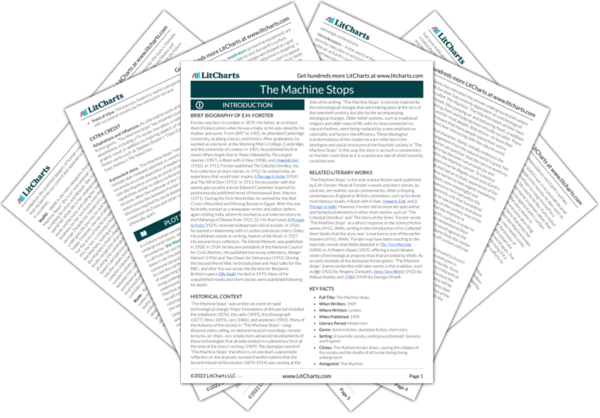Air-Ships Quotes in The Machine Stops
And of course she had studied the civilization that had immediately preceded her own—the civilization that had mistaken the functions of the system, and had used it for bringing people to things, instead of for bringing things to people. Those funny old days, when men went for change of air instead of changing the air in their rooms! And yet—she was frightened of the tunnel: she had not seen it since her last child was born. It curved—but not quite as she remembered; it was brilliant—but not quite as brilliant as a lecturer had suggested. Vashti was seized with the terrors of direct experience. She shrank back into the room, and the wall closed up again.

Unlock explanations and citation info for this and every other The Machine Stops quote.
Plus so much more...
Get LitCharts A+Few traveled in these days, for, thanks to the advance of science, the earth was exactly alike all over. Rapid intercourse, from which the previous civilization had hoped so much, had ended by defeating itself. What was the good of going to Peking when it was just like Shrewsbury? Why return to Shrewsbury when it would all be like Peking? Men seldom moved their bodies; all unrest was concentrated in the soul.
The air-ship service was a relic from the former age. It was kept up, because it was easier to keep it up than to stop it or to diminish it, but it now far exceeded the wants of the population.
And, as often happens on clear nights, [the stars] seemed now to be in perspective, now on a plane; now piled tier beyond tier into the infinite heavens, now concealing infinity, a roof limiting for ever the visions of men. In either case they seemed intolerable. “Are we to travel in the dark?” called the passengers angrily, and the attendant, who had been careless, generated the light, and pulled down the blinds of pliable metal. When the air-ships had been built, the desire to look direct at things still lingered in the world. Hence the extraordinary number of skylights and windows, and the proportionate discomfort to those who were civilized and refined.
“You know that we have lost the sense of space. We say ‘space is annihilated,’ but we have annihilated not space, but the sense thereof. We have lost a part of ourselves. I determined to recover it, and I began by walking up and down the platform of the railway outside my room. Up and down, until I was tired, and so did recapture the meaning of ‘Near’ and ‘Far.’ ‘Near’ is a place to which I can get quickly on my feet, not a place to which the train or the air-ship will take me quickly. ‘Far’ is a place to which I cannot get quickly on my feet; the vomitory is ‘far,’ though I could be there in thirty-eight seconds by summoning the train. Man is the measure. That was my first lesson. Man’s feet are the measure for distance, his hands are the measure for ownership, his body is the measure for all that is lovable and desirable and strong.”
As he spoke, the whole city was broken like a honeycomb. An air-ship had sailed in through the vomitory into a ruined wharf. It crashed downwards, exploding as it went, rending gallery after gallery with its wings of steel. For a moment they saw the nations of the dead, and, before they joined them, scraps of the untainted sky.












